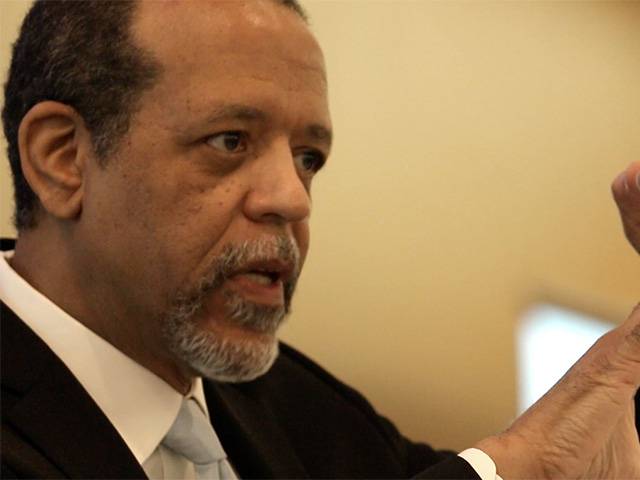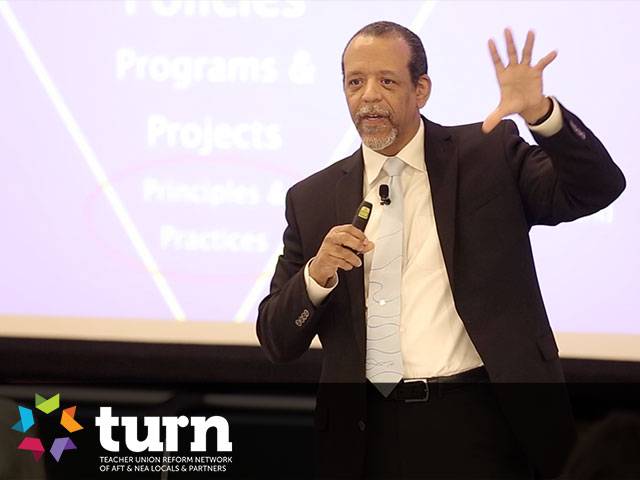Video 4 Author and Harvard professor Ron Ferguson discusses how to support students to make their way in the world, build a successful life and care about others. He defines agency as the capacity and propensity to take purposeful initiative. Students effective in agency seek meaning and act with purpose to produce the changes they desire in their own life and in others’ lives. He talks about the things that inspire agency, things that focus agency, things that enable agency, and things that express agency.
Video Transcript
[00:00:08] The big picture is we want kids to live their lives feeling empowered, feeling efficacious with a sense of agency, and there's a bunch of pieces to that, as I'll talk about, and how teaching makes a big difference to it, but also how kids' experiences and all the other aspects of their lives make a big difference to it. And how we need to be in collaboration with all the other actors that influence kids' lives, to produce what some people call ecological consistency. We need to give all our kids that sense of agency, where they decide they're going to make their way in the world, they're going to build a life, and they're going to care about other people too, as they do that and carry it along. [00:00:47] And so every one of us is not only about ourselves, we're also fulfilling other people's dreams, helping build other people's dreams. And there are some things that affect your ability to do that, and those are the things that affect agency. So let me go through and talk about some things we're learning about where it comes from. Agency is the overarching developmental goal. Agency is essentially the capacity and propensity to take purposeful initiative. It's the opposite of helplessness. Effective agents do not respond passively to their circumstances. [00:01:27] They seek meaning and act with purpose, to reduce the changes they desire in their own and others' lives. We want kids to seek meaning and who act with purpose, and so if I've got kids for whom that's true, that they're not passive, they don't respond passively, they seek meaning, they act with purpose to do with...to make things happen that they want to have happen. We, as you have heard, we do these student surveys we call tripod surveys and we try to measure what matters. And I'm going to tell you it's part of what I'll talk about, or what we've learned about how teaching predicts what we call agency-related factors. [00:02:10] That is very nuanced. There's a level of nuance and there's no way you would know it, or you could tease it out, unless you had the kind of data that we have. And we have, you know, tens or hundreds of thousands of observations from surveying kids in classrooms, and we see these subtle patterns that are very interesting, but this is just a notion that we can tie lot of stuff together into the heading of agency. So agency-related factors, the things that inspire agency, the things that help to focus the agency, the things that enable agency, and the things that express agency. [00:02:45] On each of those headings, is things that teachers affect, the things that parents affect, the things that peer dynamics affect, and I'm just I'm going to talk through some about how each of these things that happens, and each of these ecological settings where kids been their time affect these agency-related factors. I'm suggesting that agency could become an organizing idea for educators. That's what we're trying to produce. We're trying to produce agency. Most of those stuff we care about fits in relationship to that, so things that inspire agency. Just a sense of belonging. You're with a group of people, you care about them, and you're kind of inspired to act with purpose and to find meaning in those interactions. [00:03:29] Satisfaction with past achievements. You've done some things in the past, things went well, you felt good, you kind of want to feel that again, and you'll do some things to help feel it again. Growth mindset, which is a belief that effort creates ability. I like to tell kids that how smart you are depends upon how hard you work, and how long you worked hard. How smart you are depends upon how hard you work, and how long you worked hard. And the longer you work hard and the harder you work, the smarter you become. And there are actual physical changes in the brain. When we learn new things, our brain actually changes in physical ways. [00:04:08] So it's actually true. It's not just something we say because it sounds good. This interesting study people often quote of London taxi drivers, where the part of your brain where you would store the map of the metropolitan area, is bigger for London taxi drivers. It's just your brain's like a muscle. It's not a muscle but it's kind of like a muscle that when you exercise it, it grows in the areas where you exercise it. We all know that when you practice something, it gets easier. [00:04:44] You start trying to learn an instrument, first it's really hard. You practice a lot, after a while it's automatic. You kind of think a thought and the notes come out. I used to play clarinet and saxophone in a group. It gets to a point where everybody's got their limit but there is certain range within which you just kind of think it and happens. All right, and so we want kids to know that, that you're not stupid if you're feeling stupid today, okay? Well, work harder and longer, and it'll start to get easier, okay? And find sense of efficacy, sense that you can do it, "Hey, I can do this." Those things help to inspire agency. [00:05:26] Focusing Agency, your ambitions and aspirations and sense of purpose to give you a direction for the agency. Enabling agency, you've got executive function skills, which are the skills that enable us to follow through on our intentionality, enable conscientious, for example, which tend to be nurtured by the close bonds of personal relational support between mothers and infants and toddlers for example. Kids who learn to feel just safe and secure in the world start to venture out and experiment a little a bit. They develop the skills that enable the expression of intentionality, and there's a set, a part of your brains where those executive function skills are stored that allow kids to follow through and be conscientious. [00:06:15] The academic skills and knowledge, including those that standardized tests measure, enable agency and various types of social, material resources enable Agency. Social networks. Knowing somebody who knows somebody makes it more likely that the agency you attempt to exercise is going to be successful. So when we talk about pulling together as whole communities to enable agency, it's probably about creating opportunity. It's probably about making connections with kids. An expression of agency, cooperation and conduct, making effort to learn, seeking help when you need it, being conscientious. All those are expressions of agency. [00:06:55] And all the stuff I just mentioned we tend to measure and we can look at what predicts it and how those things get predicted. So you can lump a lot of things together under this notion of agency. Then agency is developed in all the places and spaces where kids experience formal and informal learning. And so we want to think about, for each of these ecological niches, what do we want to see happen. What's our vision for how things would operate in each of those places, and the roles for parents, for teachers, for peers, for employers, and the community. And there's a little poem I'm going to throw in here about agency. [00:07:31] We thought that we were powerless. All promises untrue, our dreams were trapped in darkness to be hopeful was taboo. We thought that life was preordained. No goals we could pursue could ever change our circumstance, resources were too few. Then teachers at our school began to place some new demands. They treated us like people that could actually understand. No longer could we vegetate just sitting on our hands, no longer could we pass the time as though we had no plans. They made our lessons relevant, but also made us struggle. [00:08:10] When lessons were too hard, they said our effort must redouble. Our classes became orderly and little time was wasted. We learned we could repeat the small successes that we tasted. We grew more conscientious as we learned our brains could grow. We learn we could determine how our futures would unfold. Our teachers taught us agency. The future now is bright. Because they lit the path, once hidden dreams have taken flight. [00:08:41] That's what we want for our kids, we want those once hidden dreams in communities where kids thought, "nothing we could do to make any difference" to kind of take flight. And we have the power to do that not just as individuals but as communities. [00:08:54]









